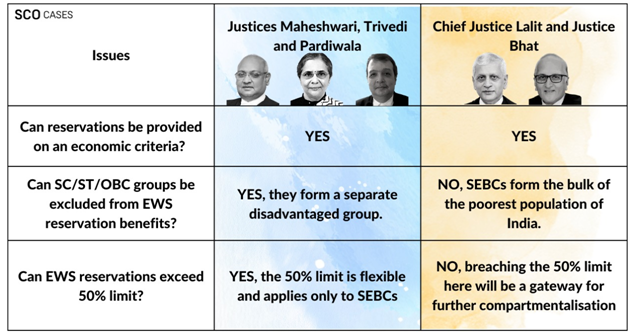SC Upholds Ews Quota in 3-2 Split Verdict, Cji in Minority
26-08-2023
12:20 PM
1 min read

What’s in today’s article:
- Background
- About EWS Reservations (Constitutional Amendment, Eligibility, Coverage, etc.)
- News Summary (Supreme Court’s Judgement)
Why in news?
- A five-judge constitution bench of the Supreme Court, by a 3-2 majority, upheld the validity of 103rd Constitutional Amendment Act, 2019.
Background:
- Reservation for Economically Weaker Sections (EWS) of the society was granted based on the recommendations of a commission headed by Major General (retd) S R Sinho.
- The Commission was constituted by the then Union government in 2005, and submitted its report in 2010.
- To implement this, a Cabinet Note was prepared by the Ministry of Social Justice and Empowerment in 2019.
- Based on this, the Cabinet, in 2019, decided to amend the Constitution (103rd Amendment) to provide reservation to EWS.

About EWS Reservations:
- The 103rd Constitutional Amendment Act, 2019added Clause (6) to Article 15 of the Constitution to give the government the authority to make special provisions for the EWS among citizens who are not already eligible for reservation.
- The Act allows up to 10 per cent reservation in public and private educational institutions, whether aided or unaided, with the exception of minority-run institutions.
- The Act also added Clause (6) to Article 16 of the Constitution to make employment reservations easier.
- Article 16 of the Indian Constitution guarantees equal opportunity to all citizens in matters related to employment in the public sector.
- The Act also added Clause (6) to Article 16 of the Constitution to make employment reservations easier.
- It was enacted to promote the welfare of the poor not covered by the 50% reservation policy for Scheduled Castes (SCs), Scheduled Tribes (STs) and Other Backward Classes (OBCs).
- The Act states unequivocally that the EWS reservation will be added to the existing reservation.
Eligibility Criteria:
- Candidate's annual family income must be less than Rs. 8 lakhs per annum,
- Their family must not own more than 5 acres of agriculture land,
- The residential flat area should be below 1000 sq. ft.,
- The residential plot's area should be below 100 square yards if in a notified municipality sector,
- The residential plot's area should be below 200 square yards if in a non-notified municipality sector.
Which institutions are covered?
- EWS certificate can be used to avail the 10% reservation for the GEN-Economically Weaker Section in higher education and government jobs all over India.
News Summary:
- By a majority of 3:2, a five-judge Bench of the Supreme Court has upheld the validity of the 103rd Constitution Amendment, which came into effect in January 2019.
- The amendment was challenged, and the challenge was referred to a five-judge Constitution Bench in August 2020.
- The challenge was based on the argument that the 103rd amendment violated the “basic structure” of the Constitution.
- The Supreme Court had introduced the doctrine of basic structure in the landmark Kesavananda Bharati case, by which it ruled that certain aspects of the Constitution were inviolable, and could not be changed.
- The primary argument in this case was that the special protections guaranteed to socially disadvantaged groups is part of the basic structure.
- The petitioners argued that the 103rd Amendment departs from this by promising special protections on the sole basis of economic status.
Supreme Court’s Judgement:
- Three judges, Justices Dinesh Maheshwari, Bela Trivedi, and S B Pardiwala, have upheld the validity of the 103rd amendment.
- Justice Dinesh Maheshwari has ruled that reservation based only on economic criteria does not violate the basic structure of the Constitution.
- He also added that the exclusion of classes covered in Article 15(4) and 16(4) — that is OBCs and SC/STs — in the 103rd amendment does not damage the basic structure.
- Justice Bela Trivedi ruled that treating EWS as a separate class would be a reasonable classification, and that treating unequal equally would violate the principle of equality under the Constitution.
- Justice Trivedi said that 75 years after independence, it was time to revisit the system of reservation in the larger interest of society.
- Justice S B Pardiwala observed that “Reservation is not an end, it is means, it should not be allowed to become a vested interest”.
Dissenting Judgement:
- The dissenting judgement has come from Justice S Ravindra Bhat and Chief Justice of India U U Lalit.
- Justice Bhat has ruled that while reservation on economic criteria is per se not violative of the Constitution, excluding SC/ST/OBC from the purview of EWS is violative of basic structure.
- He has struck down Articles 15(6) and 16(6) for being discriminatory and violative of the equality code.
- CJI U U Lalit said he concurs entirely with the judgment of Justice Bhat.

